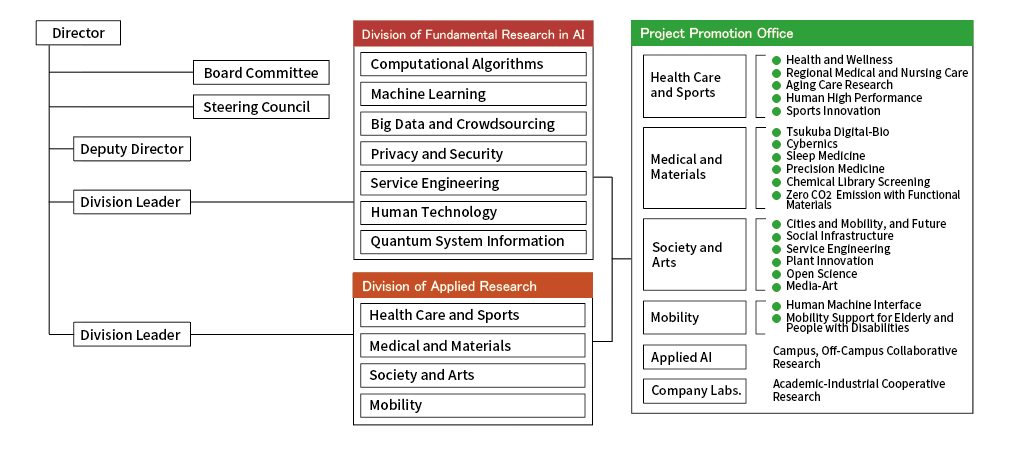Organizational Structure
The C-AIR is composed of the “Artificial Intelligence Infrastructure Research Division” and the “Project Research Division.”
In the Artificial Intelligence Infrastructure Research Division, we conduct basic research on fundamental fields of AI, such as machine learning, mathematical algorithms, quantum system information, big data analysis, cloud infrastructure, and privacy protection. In addition to these, we also conduct research on fundamental technologies that support the application of Service Engineering and Human Technology.
The Project Research Division is divided into four fields: “Health Care and Sports,” “Medical and Material,” “Society and Arts,” and “Mobility.”
Researchers from other departments and projects in Tsukuba University and other Research Institutions coordinate and collaborate with researchers from the Artificial Intelligence Infrastructure Research Division in application-oriented research projects.
The field of “Health Care and Sports” promotes research in these fields using health and medical care data held by municipalities, developing projects for the use of AI in data analysis of regional medical care, comprehensive care, and services. Working in cooperation with the Human High Performance Research Center, this field also performs research on state-of-the-art sports measurement and data visualization technology and virtual reality.
In the “Medical and Materials” field, we are developing a system for automatic sleep stage determination using machine learning in collaboration with the International Institute for Integrated Sleep Medicine (WPI-IIIS) and the Center for Computational Science Research. We are also developing Digital-Bio research through integrating biological science and digital/AI technology with the Tsukuba Digital-Bio International Center, research on innovative Cybernic Systems in cooperation with the Center for Cybernics Research, and research on the next-generation sequencer, along with a functional prediction of candidate substances using chemical screening in collaboration with the Precision Medicine Development Research Center.
In the “Society and Arts” field, we collaborate with the R&D Center for Frontiers of MIRAI in Policy and Technology and municipal governments on the research of regional infrastructure and basic research on the social engineering of future societies. Also, we accelerate research and development on fundamental technologies for “Green Innovation” by leveraging AI technology with the R&D Center for Zero CO2 Emission with Functional Materials. Using data analysis and artistic approaches, we perform research work on design, service engineering, and the development of future agricultural industries.
In the “Mobility” field, we investigate technologies for developing self-driving cars and advanced driving support technology, based on driver and pedestrian movement analysis and risk assessment. This also includes applications of these technologies in various fields such as drone systems and the Naval fields.
